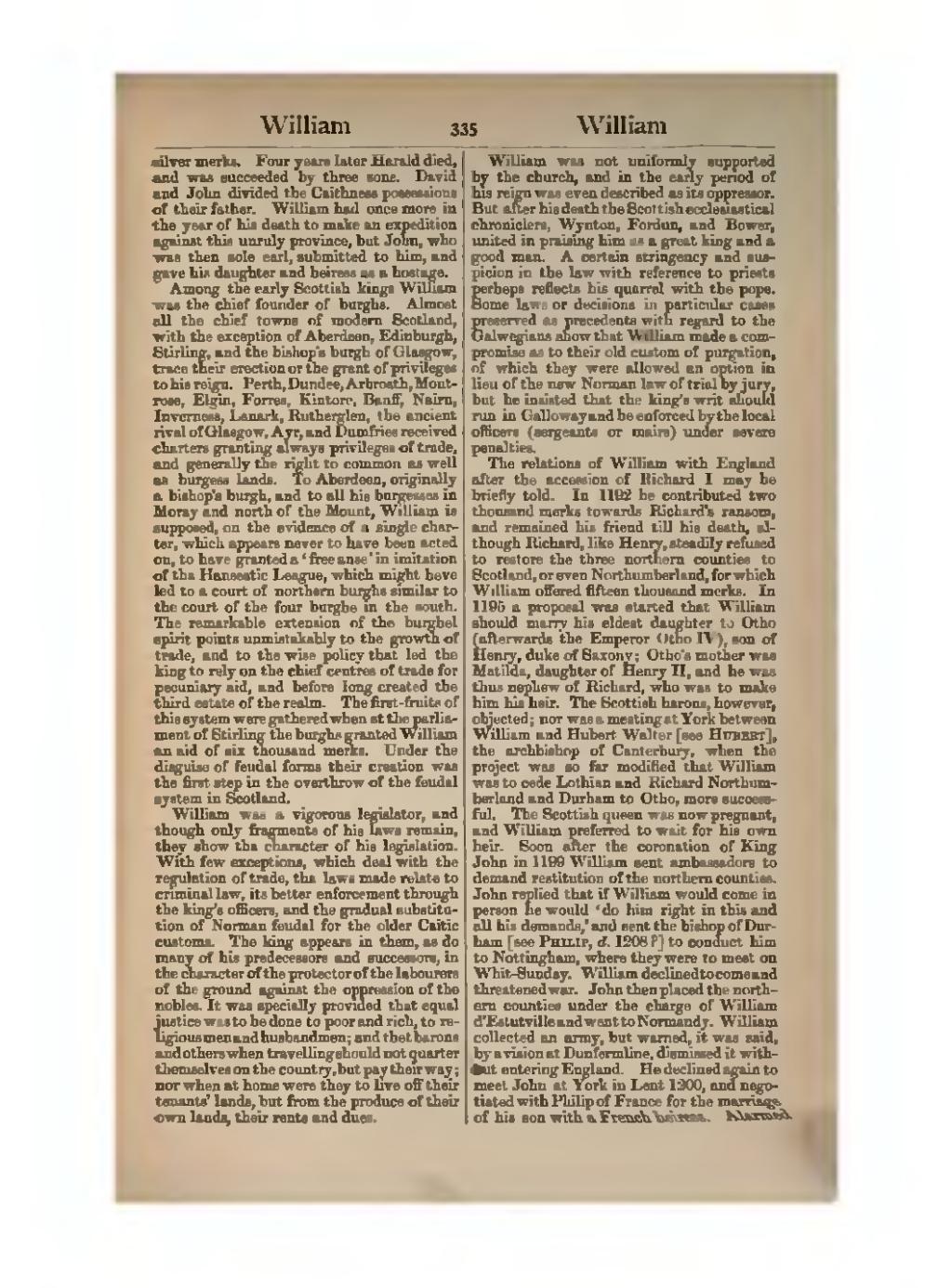silver merks. Four years later Harald died, and was succeeded by three sons. David and John divided the Caithness possessions of their father. William had once more in the year of his death to make an expedition against this unruly province, but John, who was then sole earl, submitted to him, and gave his daughter and heiress as a hostage.
Among the early Scottish kings William was the chief founder of burghs. Almost all the chief towns of modern Scotland, with the exception of Aberdeen, Edinburgh, Stirling, and the bishop's burgh of Glasgow, trace their erection or the grant of privileges to his reign. Perth, Dundee, Arbroath, Montrose, Elgin, Forres, Kintore, Banff, Nairn, Inverness, Lanark, Rutherglen, the ancient rival of Glasgow, Ayr, and Dumfries received charters granting always privileges of trade, and generally the right to common as well as burgess lands. To Aberdeen, originally a bishop's burgh, and to all his burgesses in Moray and north of the Mount, William is supposed, on the evidence of a single charter, which appears never to have been acted on, to have granted a ‘free anse’ in imitation of the Hanseatic League, which might have led to a court of northern burghs similar to the court of the four burghs in the south. The remarkable extension of the burghal spirit points unmistakably to the growth of trade, and to the wise policy that led the king to rely on the chief centres of trade for pecuniary aid, and before long created the third estate of the realm. The first-fruits of this system were gathered when at the parliament of Stirling the burghs granted William an aid of six thousand merks. Under the disguise of feudal forms their creation was the first step in the overthrow of the feudal system in Scotland.
William was a vigorous legislator, and though only fragments of his laws remain, they show the character of his legislation. With few exceptions, which deal with the regulation of trade, the laws made relate to criminal law, its better enforcement through the king's officers, and the gradual substitution of Norman feudal for the older Celtic customs. The king appears in them, as do many of his predecessors and successors, in the character of the protector of the labourers of the ground against the oppression of the nobles. It was specially provided that equal justice was to be done to poor and rich, to religious men and husbandmen; and that barons and others when travelling should not quarter themselves on the country, but pay their way; nor when at home were they to live off their tenants' lands, but from the produce of their own lands, their rents and dues.
William was not uniformly supported by the church, and in the early period of his reign was even described as its oppressor. But after his death the Scottish ecclesiastical chroniclers, Wynton, Fordun, and Bower, united in praising him as a great king and a good man. A certain stringency and suspicion in the law with reference to priests perhaps reflects his quarrel with the pope. Some laws or decisions in particular cases preserved as precedents with regard to the Galwegians show that William made a compromise as to their old custom of purgation, of which they were allowed an option in lieu of the new Norman law of trial by jury, but he insisted that the king's writ should run in Galloway and be enforced by the local officers (sergeants or mairs) under severe penalties.
The relations of William with England after the accession of Richard I may be briefly told. In 1192 he contributed two thousand merks towards Richard's ransom, and remained his friend till his death, although Richard, like Henry, steadily refused to restore the three northern counties to Scotland, or even Northumberland, for which William offered fifteen thousand merks. In 1195 a proposal was started that William should marry his eldest daughter to Otho (afterwards the Emperor Otho IV), son of Henry, duke of Saxony; Otho's mother was Matilda, daughter of Henry II, and he was thus nephew of Richard, who was to make him his heir. The Scottish barons, however, objected; nor was a meeting at York between William and Hubert Walter [see Hubert], the archbishop of Canterbury, when the project was so far modified that William was to cede Lothian and Richard Northumberland and Durham to Otho, more successful. The Scottish queen was now pregnant, and William preferred to wait for his own heir. Soon after the coronation of King John in 1199 William sent ambassadors to demand restitution of the northern counties. John replied that if William would come in person he would ‘do him right in this and all his demands,’ and sent the bishop of Durham [see Philip, d. 1208?] to conduct him to Nottingham, where they were to meet on Whit-Sunday. William declined to come and threatened war. John then placed the northern counties under the charge of William d'Estutville and went to Normandy. William collected an army, but warned, it was said, by a vision at Dunfermline, dismissed it without entering England. He declined again to meet John at York in Lent 1200, and negotiated with Philip of France for the marriage of his son with a French heiress. Alarmed
